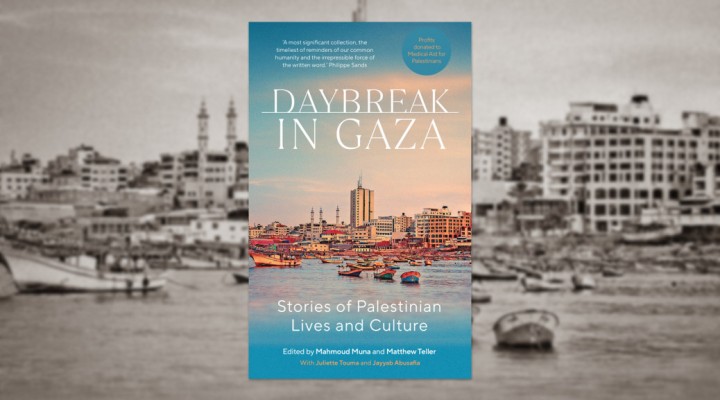Capturing unheard voices in Daybreak in Gaza: Stories of Palestinian Lives and Culture

‘Daybreak in Gaza’ reveals the lives, culture, and voices of Gazans amidst Israel’s ongoing genocide, uncovering stories hidden from the world
While the publication of Daybreak in Gaza: Stories of Palestinian Lives and Culture (Saqi Books, 2024) may seem timely given Israel’s genocide against Palestinians in the enclave, a more troubling truth emerges: how little the world knows of Gaza due to mainstream media portrayals and the silencing of Palestinian voices, which clears the way for Israel’s colonial narrative.
In the preface, editors Mahmoud Muna and Matthew Teller write, “At a time of profound anguish, bereavement and loss, we found that Gazans – even those surviving starvation and bombardment inside Gaza – were not only willing to talk, but often desperate to do so.”
By providing a platform for these voices, Daybreak in Gaza includes stories and accounts gathered between March and May of this year, a time when the genocide was already well underway, and the humanitarian pauses proposed by the international community were assisting Israel’s plans to destroy Gaza.
With a focus on Israel’s genocide, one account in the book comes from Youmna El Sayed, a Palestinian journalist, who writes, “We are direct targets of the Israeli army.”
Another account is that of Ibrahim Yaghi, who shared the tactics of the Israeli army.
One day, the army called his brother to evacuate the house. A cousin answered the phone, and the officer immediately addressed him upon hearing his voice. “Somehow, the Israeli army knew to call my brother’s phone – and somehow they knew my cousin Hesham would answer. They seem to know everything about us,” Ibrahim writes.
Ahmed Mortaja wrote about his fear of becoming just a number in the genocide. “I hate answers, and I love questions,” Mortaja writes. “A question two days ago made me stop and think: What’s the difference between escalation and war?”
Speaking on behalf of his five-year-old nephew, Mohammed Aghaalkurdi commented on Israel’s actions, highlighting that what we are witnessing is a genocide specifically targeting children, aimed at wiping out the younger generations of Palestinians in its ongoing ethnic cleansing of Palestine.
“Children like me can’t find any snacks or lollipops. Now do you understand why this is a war against us, not you?” Mohammed writes.
Asmaa Mustafa also addresses the children of Gaza, highlighting the trauma they face during wartime. She warns that Palestinians have “to learn through experience what schools don’t teach and what could never be read in textbooks.”
Asmaa adds, “Here, we find young children specialising in political analysis.”
On a different note, Amani Shaltout speaks about education as the way forward for Gaza and describes her role at the UN Relief and Works Agency for Palestine Refugees (UNRWA), where she trains photographers and helps preserve the agency’s photo archive on Palestine.
Stories beyond genocide
Beyond the discussion of Israel’s genocide, other testimonies in Daybreak in Gaza reveal what we should have known about Gaza.
The book tells the world how much of Palestine should have been preserved, showing a rich culture that spans centuries and connects to the rest of the world – a culture of inclusion, spontaneity, beauty, and heritage: archaeology, agriculture, landscapes, education, music, and ethnicities.
Take Gaza’s sea, for example. As the book mentions, while Israel denies safety for Palestinians in Gaza, even from the sea, it was once a place that offered safety for Gazans and a means of escape.
Yousef Alkhouri shares his family’s history against the backdrop of the sea in Gaza and its importance. “Gaza’s sea is not just a natural resource. People think of it as a friend… The sea keeps everything safe.”
 TheAltWorld
TheAltWorld 
0 thoughts on “Capturing unheard voices in Daybreak in Gaza: Stories of Palestinian Lives and Culture”